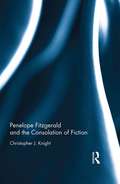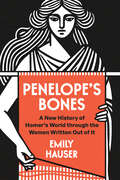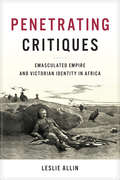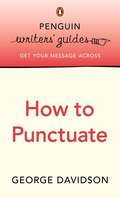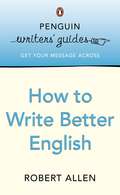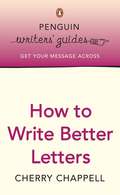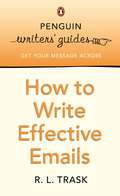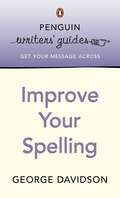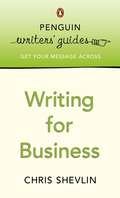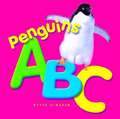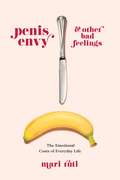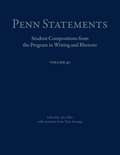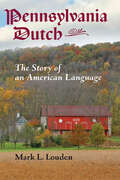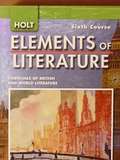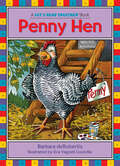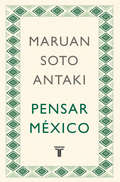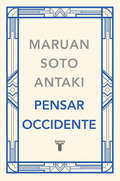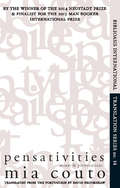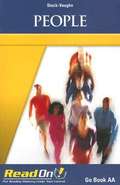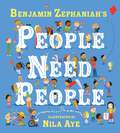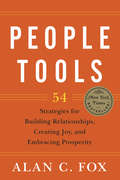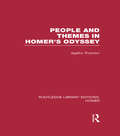- Table View
- List View
Penelope Fitzgerald and the Consolation of Fiction
by Christopher KnightChristopher J. Knight’s Penelope Fitzgerald and the Consolation of Fiction is a study of the British author Penelope Fitzgerald (1916 – 2000), attending to her nine novels, especially as viewed through the lens both of "late style" (she published her first novel, The Golden Child, at age sixty) and, in her words, of "consolation, that is, for doubts and fears as well as for naked human loss." As in Shakespeare’s late, religiously inflected, romances, the two concerns coincide; and Fitzgerald’s ostensible comedies are marked by a clear experience of the tragic and the palpable sense of a world that verges on the edge of indifference to human loss. Yet Fitzgerald, her late age pessimism notwithstanding, seeks (with the aid of her own religious understandings), in each of her novels, to wrestle meaning, consolation and even comedy from circumstances not noticeably propitious. Or as she herself memorably spoke of her own "deepest convictions": "I can only say that however close I’ve come, by this time, to nothingness, I have remained true to my deepest convictions—I mean to the courage of those who are born to be defeated, the weaknesses of the strong, and the tragedy of misunderstandings and missed opportunities, which I have done my best to treat as a comedy, for otherwise how can we manage to bear it?" The recipient of Britain’s Booker Prize and America’s National Book Critics Circle Award, Penelope Fitzgerald’s reputation as a novelist, and author more generally, has grown, since her death, significantly, to the point that she is now widely judged one of Britain’s finest writers, comparable in worth to the likes of Jane Austen, George Eliot and Virginia Woolf.
Penelope’s Bones: A New History of Homer’s World through the Women Written Out of It
by Emily HauserWeaving together literary and archaeological evidence, Emily Hauser illuminates the rich, intriguing lives of the real women behind Homer’s Iliad and Odyssey. Achilles. Agamemnon. Odysseus. Hector. The lives of these and many other men in the greatest epics of ancient Greece have been pored over endlessly in the past three millennia. But these are not just tales about heroic men. There are scores of women as well—complex, fascinating women whose stories have gone unexplored for far too long. In Penelope’s Bones, award-winning classicist and historian Emily Hauser pieces together compelling evidence from archaeological excavations and scientific discoveries to unearth the richly textured lives of women in Bronze Age Greece—the era of Homer’s heroes. Here, for the first time, we come to understand the everyday lives and experiences of the real women who stand behind the legends of Helen, Briseis, Cassandra, Aphrodite, Circe, Athena, Hera, Calypso, Penelope, and more. In this captivating journey through Homer’s world, Hauser explains era-defining discoveries, such as the excavation of Troy and the decipherment of Linear B tablets that reveal thousands of captive women and their children; more recent finds like the tomb of the Griffin Warrior at Pylos, whose tomb contents challenge traditional gender attributes; DNA evidence showing that groups of warriors buried near the Black Sea with their weapons and steeds were, in fact, Amazon-like female fighters; a prehistoric dye workshop on Crete that casts fresh light on “women’s work” of dyeing, spinning, and weaving textiles; and a superbly preserved shipwreck off the coast of Turkey whose contents tell of the economic and diplomatic networks crisscrossing the Bronze Age Mediterranean. Essential reading for fans of Madeline Miller or Natalie Haynes, this riveting new history brings to life the women of the Bronze Age Aegean as never before, offering a groundbreaking reassessment of the ancient world.
Penetrating Critiques: Emasculated Empire and Victorian Identity in Africa
by Leslie AllinTracing the intersections between archival documents and immensely popular adventure fiction set in Africa, Penetrating Critiques highlights the anxieties surrounding the vulnerability of the white male body by assessing the destabilization of narrative itself. The author considers texts ranging from private letters, governmental correspondence, periodicals, and archives to the popular works of H. Rider Haggard, Richard Marsh, and Joseph Conrad. These texts trouble the notions of bounded male bodies, impermeable histories, and solid virtues while underscoring the grotesqueness of male forms, narratives, and moralities. Although dominant representations of martial bodies frequently emphasized boundaries, containment, and solidity, the fiction and imperial archives explored in this book expose problems of stability through tropes, images, and material evidence of perforation, penetration, and dissolution. In emphasizing the relationship between institutional imperial writing and popular discourse, Penetrating Critiques reveals that more complex, fraught, and critical approaches to imperialism and masculinity were circulating throughout Victorian culture than previously recognized.
Penguin Writers' Guides: How to Punctuate
by George DavidsonThe Penguin Writers' Guides series provides authoritative, succinct and easy-to-follow guidance on specific aspects of written English. Whether you need to brush up your skills or get to grips with something for the first time, these invaluable Guides will help you find the best way to get your message across clearly and effectively. This practical one-stop guide explains all the punctuation marks you are ever likely to encounter - and gives advice for writing on computer, such as the use of italics and boldface type. From apostrophes to accents, it shows you which marks to use and where to put them in a sentence, with helpful examples of correct and incorrect use. Ideal for both quick reference and in-depth browsing, the guide provides all the tips and techniques you will need for accurate punctuation.
Penguin Writers' Guides: How to Write Better English
by Robert AllenThe Penguin Writers' Guides series provides authoritative, succinct and easy-to-follow guidance on specific aspects of written English. Whether you need to brush up your skills or get to grips with something for the first time, these invaluable Guides will help you find the best way to get your message across clearly and effectively. This essential guide covers the key rules - and pitfalls - of written and spoken grammar. It covers such areas as: the building blocks of language, common errors and misconceptions, choosing the right level of expression, differences between British and American English, and political correctness. It also discusses various uses of language, from creative writing, CVs and reports to verbal presentations, and business and personal letters, with many useful suggestions for accurate and fluent English.
Penguin Writers' Guides: How to Write Better Letters
by Cherry ChappellThe Penguin Writers' Guides series provides authoritative, succinct and easy-to-follow guidance on specific aspects of written English. Whether you need to brush up your skills or get to grips with something for the first time, these invaluable Guides will help you find the best way to get your message across clearly and effectively.A simple and practical guide, How to Write Better Letters explains how to write a wide range of letters, from invitations and letters of condolence to practical correspondence including complaints, job applications, letters of resignation and those trying to raise sponsorship. Drawing on advice from a variety of experts and containing many authentic letters as examples, this guide also details the appropriate title to give any correspondent, outlines common mistakes in spelling and grammar, and provides essential tips on matters such as setting the correct tone when writing emails.
Penguin Writers' Guides: How to Write Effective Emails
by R L TraskThe Penguin Writers' Guides series provides authoritative, succinct and easy-to-follow guidance on specific aspects of written English. Whether you need to brush up your skills or get to grips with something for the first time, these invaluable Guides will help you find the best way to get your message across clearly and effectively.Many of us are spending more and more time using emails, especially at work. This practical guide steers you through all the basics and 'netiquette' of emailing strangers, business contacts and colleagues: from setting up an email account, presentation and formatting of your emails to how to avoid offensive blunders and the legal issues surrounding this kind of writing. It offers indispensable guidance for simple and direct writing - including cultural differences, appropriate language and common pitfalls - so that your emails give the best possible impression.
Penguin Writers' Guides: Improve Your Spelling
by George DavidsonThe Penguin Writers' Guides series provides authoritative, succinct and easy-to-follow guidance on specific aspects of written English. Whether you need to brush up your skills or get to grips with something for the first time, these invaluable Guides will help you find the best way to get your message across clearly and effectively. From silent, double and capital letters to foreign words, proper names and common errors, this easy-to-use book offers expert advice for correct spelling in all your written work. It takes you through the basic rules, traps and snares, and provides invaluable guidance with its seven key ways to improve your spelling. Ideal for both quick browsing and in-depth use, this is the essential route to accurate, confident spelling.
Penguin Writers' Guides: Writing for Business
by Chris ShevlinThe Penguin Writers' Guides series provides authoritative, succinct and easy-to-follow guidance on specific aspects of written English. Whether you need to brush up your skills or get to grips with something for the first time, these invaluable Guides will help you find the best way to get your message across clearly and effectively.Business demands many different types of writing skills - from creating proposals and presentations to compiling reports and briefings. This one-stop, no-nonsense guide shows you how to improve your writing at work: including how to discover your strengths and weaknesses, how to identify your audience, how to develop your argument and keep information flowing while avoiding overused jargon. It shows how to make the most of the language you use and make your writing effective and influential.
Penguins ABC
by Kevin SchaferAfter going through the alphabet with words that relate to penguins and their habits, Kevin Schafer (author of Penguin Planet) provides additional information about each element--"W is for Waddle: Penguins do not have knees to help their legs bend like people do, so when they walk they have to keep their legs straight. This is what causes them to waddle from side to side as they walk, and what makes them look so funny!" A delightful and informative book for young readers.
Penguins Love Their ABC's
by Sarah AspinallSix of the most appealing penguins ever (featured in Sarah Aspinall's Penguins Love Colors, 2016) set off on an exciting Alphabet Hunt, a fun adventure where Mama has hidden all the alphabet letters in the snow. Each letter is marked by a clue (an "apple" leads to "a"). Will you help the penguins find all the hidden letters? Of course you will! At the end of the joyful Alphabet Hunt, it's time to gobble up a big bowl of Mama's yummy alphabet soup, where words are hidden, too. All the penguins love their ABC's -- but not as much as they love Mama Penguin, who hugs them all in a warm, comforting expression of affection. All children need to learn the alphabet, and from a big red heart ("h") to six sets of lucky underpants ("u"), children will recognize all the clues and letters. Perfect for school or home, Sarah Aspinall's irresistible penguins will help children learn their letters, with plenty of opportunities to review and test their knowledge. It's as simple as ABC!
Penis Envy and Other Bad Feelings: The Emotional Costs of Everyday Life
by Mari RutiMari Ruti combines theoretical reflection, cultural critique, feminist politics, and personal experience to analyze the prevalence of bad feelings in contemporary everyday life. Proceeding from a playful engagement with Freud’s idea of penis envy, Ruti’s autotheoretical commentary fans out to a broader consideration of neoliberal pragmatism. She focuses on the emphasis on good performance, high productivity, constant self-improvement, and relentless cheerfulness that characterizes present-day Western society. Revealing the treacherousness of our fantasies of the good life, particularly the idea that our efforts will eventually be rewarded—that things will eventually get better—Ruti demystifies the false hope that often causes us to tolerate an unbearable present.Theoretically rigorous and lucidly written, Penis Envy and Other Bad Feelings is a trenchant critique of contemporary gender relations. Refuting the idea that we live in a postfeminist world where gender inequalities have been transcended, Ruti describes how neoliberal heteropatriarchy has transformed itself in subtle and stealthy, and therefore all the more insidious, ways. Mobilizing Michel Foucault’s concept of biopolitics, Jacques Lacan’s account of desire, and Lauren Berlant’s notion of cruel optimism, she analyzes the rationalization of intimacy, the persistence of gender stereotypes, and the pornification of heterosexual culture. Ruti shines a spotlight on the depression, anxiety, frustration, and disenchantment that frequently lie beneath our society’s sugarcoated mythologies of self-fulfillment, romantic satisfaction, and professional success, speaking to all who are concerned about the emotional costs of the pressure-cooker ethos of our age.
Penn Statements, Vol. 40: Student Compositions from the Program in Writing and Rhetoric
by Alex SiboPenn Statements is a reader of student essays and compositions from courses offered through Penn State's Program in Writing and Rhetoric. All essays are submitted by students and are used as examples of student writers engaging with rhetorical principles.
Pennsylvania Dutch: The Story of an American Language (Young Center Books in Anabaptist and Pietist Studies)
by Mark L. LoudenThe fascinating story of America's oldest thriving heritage language.Winner of the Dale W. Brown Book Award by the Young Center for Anabaptists and Pietist Studies at Elizabethtown CollegeWhile most world languages spoken by minority populations are in serious danger of becoming extinct, Pennsylvania Dutch is thriving. In fact, the number of Pennsylvania Dutch speakers is growing exponentially, although it is spoken by less than one-tenth of one percent of the United States population and has remained for the most part an oral vernacular without official recognition or support. A true sociolinguistic wonder, Pennsylvania Dutch has been spoken continuously since the late eighteenth century despite having never been "refreshed" by later waves of immigration from abroad.In this probing study, Mark L. Louden, himself a fluent speaker of Pennsylvania Dutch, provides readers with a close look at the place of the language in the life and culture of two major subgroups of speakers: the "Fancy Dutch," whose ancestors were affiliated mainly with Lutheran and German Reformed churches, and traditional Anabaptist sectarians known as the "Plain people"—the Old Order Amish and Mennonites.Drawing on scholarly literature, three decades of fieldwork, and ample historical documents—most of which have never before been made accessible to English-speaking readers—this is the first book to offer a comprehensive look at this unlikely linguistic success story.
Pennsylvania Holt Elements of Literature, Sixth Course
by Rinehart Holt WinstonThe text conforms to Pennsylvania Academic Standards for Language Arts, i.e. Standards for Reading, Writing, and Speaking and Listening. These standards describe what you are expected to learn and do as a Pennsylvania high school student.
Penny Hen: Short Vowel E (Let's Read Together ®)
by Barbara deRubertisLet&’s Read Together books merge rhyme and vowel sounds in delightfully zany stories kids will want to read again and again. Each of the 15 books in this classic series by award-winning author/educator Barbara deRubertis will give your child a jumpstart on reading success."Story lines are silly and inventive, and recall Dr. Seuss&’s Cat in the Hat for the building of rhythm and rhyming words." —School Library JournalPenny Hen is a bit upset when she learns she won't be Jenny's only pet! (This easy-to-read story features the short &“e&” vowel sound.)
Penny and the Punctuation Bee
by Moira Rose Donohue Jenny LawElsie, an exclamation point, announces loudly that she's sure she'll win the school Punctuation Bee. After all, an exclamation point has won the last three years. But Penny, a period, and her friend, Quentin, a question mark, decide to practice and practice. More than anything, Penny wants to beat Elsie, who brags way too much! The bee begins and one by one, the punctuation marks drop out. Finally, as the loudspeaker announces the end of the school day, only Quentin, Penny, and Elsie remain. It looks like a three-way tie. Then Quentin asks an important question that saves the day--for Penny! Moira Donohue, author of Alfie the Apostrophe, again makes punctuation fun in this up-close look at the important mark that stops everything--the period. Jenny Law's lively illustrations add just the right touch.
Pensar México
by Maruan Soto Antaki¿Hemos construido un país de solucionólogos y comentócratas? ¿Por qué la violencia y la humillación parecen inherentes a nuestra historia? Pensar México es una verdadera radiografía cultural de nuestro país. En Pensar Medio Oriente, Maruan Soto Antaki plantea preguntas esenciales para entender el mundo árabe(¿arabe es sinónimo de islámico? ¿Es indisociable el Islam del terrorismo? ¿Qué tan profundas son las raíces de los conflictos?) Ahora, centra su atención en un ámbito más cercano: México. Para entender Medio Oriente, debíamos dirigir nuestra mirada al lenguaje, pues ahí está el corazón de la cultura árabe. En el caso de México, hay que hacer lo mismo. La forma como hablamos y como callamos los mexicanos dice mucho de quiénes somos. Soto Antaki cuestiona la difundida idea de que, en México, el significado de las palabras varía dependiendo del contexto (según esto, podríamos insultar con afecto o sin tener la intención de agredir). Esto no es así: el problema es que, al relativizar el lenguaje al grado en el que lo hemos hecho, hemos vaciado a las palabras de significado. Ley, corrupción, orden: son palabras que pueden querer decir todo y nada. Esta erosión de significado revela un problema realmente grave, dado que el lenguaje es el principal elemento civilizatorio y que las élites culturales de nuestro país parecen haber renunciado a construir discursos públicos, ya sólo se hablan a sí mismas.
Pensar Occidente (Pensar el mundo #Volumen 3)
by Maruan Soto AntakiOccidente es una ambigüedad que, sin embargo, se comporta como una definición. Su situación paradójica lo es tanto como las contradicciones que genera dentro y fuera de sí mismo. Occidente es una ambigüedad que, sin embargo, se comporta como una definición. Su situación paradójica lo es tanto como las contradicciones que genera dentro y fuera de sí mismo. Los dos libros que precedieron a éste, Pensar Medio Oriente y Pensar México, surgieron de las posibilidades de ver lo medioriental desde el otro lado del Atlántico, y de ver lo mexicano desde los confines del Mediterráneo, así como de la crisis y el conflicto en que se encuentran mis territorios de pertenencia. ¿Occidente vive una crisis que lleva a pensar en él bajo esos mismos términos? La primera distancia con lo occidental se tiene viviendo en Occidente. Occidente está descompuesto, pero me niego a claudicar en las perspectivas de democracia, República y libertad que un día se establecieron en él. El advenimiento de los ismos -nacionalismos, nativismos, extremismos, etcétera- es sólo uno de los fenómenos que me llevan a notar el rompimiento de los acuerdos sociales que un día creímos que estaban afianzándose. Creo que es necesario revisar qué sucede cuando la democracia entra en los terrenos de la indiferencia, cuando la posibilidad de convivencia multicultural se percibe como un riesgo que rechaza el aprendizaje del pasado y da cabida a la violencia. Maruan Soto Antaki
Pensativities
by Mia Couto David Brookshaw"One of the greatest living writers in the Portuguese language."--Philip Graham, The Millions"Subtle and elegant."--The Wall Street Journal"At once deadpan and beguiling."--The Times Literary Supplement"To understand what makes António 'Mia' Emílio Leite Couto special--even extraordinary--we have to loosen our grip on the binary that distinguishes between 'the West' and 'Africa.' Couto is 'white' without not being African, and as an 'African' writer he's one of the most important figures in a global Lusophone literature that stretches across three continents."--The New InquiryWhat would Barack Obama's 2004 campaign have looked like if it unfolded in an African nation? What does it mean to be an African writer today? How do writers and poets from all continents teach us to cross the sertão, the savannah, the barren places where we're forced to walk within ourselves? Bringing together the best pieces from his previously untranslated nonfiction collections, alongside new material presented here for the first time in any language, Pensativities offers English readers a taste of Mia Couto as essayist, lecturer, and journalist--with essays on cosmopolitanism, poverty, culture gaps, conservation, and more.Mia Couto, an environmental biologist from Mozambique, is the author of twenty five books of fiction, nonfiction, and poetry. His work has been translated into twenty languages worldwide. In 2007 he was the first African author to win the Latin Union Award for Romance Languages, in 2013 he was awarded the 100,000 Camões Prize for Literature, and in 2014 he received World Literature Today's $50,000 Neustadt Prize for Literature.
People (Read On! Go Book AA)
by Harcourt Achieve30 short stories designed to increase reading comprehension.
People Need People
by Benjamin ZephaniahTo walk toTo talk toTo cry and rely on,People will always need people . . .From the creators of Nature Trail comes an uplifting picture book about the power of people, and the importance of connecting with others. This timely poem reminds us all to be kind to one another.Written by legendary poet, Benjamin Zephaniah, one of The Times' top 50 British post-war writers. Beautifully illustrated by Nila Aye.Praise for Nature Trail:A joy to read with small children - Independent
People Tools
by Alan C. FoxGetting along well with others is the real secret to success and happiness. In tens of thousands of classrooms we teach reading, writing, and arithmetic and yet we leave solutions to the universal problems of human relationships to be discovered, if at all, by trial and error. The trial is painful and the error is costly. People Tools: 54 Strategies for Building Relationships, Creating Joy, and Embracing Prosperity, provides time-proven techniques that you can use to build a better, happier, more successful life. It is the perfect resource for busy people looking for fast and effective solutions to the challenges we face every day. "People Tools" are practical and easy to understand. From developing self-confidence, to improving communication skills, to finding constructive ways to resolve conflict, each "People Tool" addresses a specific issue and provides a simple, straightforward strategy that you can adopt to bring about a positive result. Open the book to any page and you will find a useful solution. Each tool is illustrated with insightful stories and amusing anecdotes that are relevant and relatable. The stories will reel you in but the advice will change your life. "This book will do a lot for the world. " - Bill CosbyAlthough you may recognize the more intuitive techniques in People Tools, this sourcebook provides explanations and helpful examples from a vast collection of different tools designed to help you further expand your own existing repertoire of skills. Some of the useful "People Tools" in the book include:1. The Belt Buckle. When words are different than action (The Belt Buckle), trust the Belt Buckle, not the words. 2. Buy a Ticket. To make something good happen in your life you have to participate. 3. Catching a Feather. An alternative to the endless chase, this Tool reveals how to attract people you want to be closer to. 4. Patterns Persist. Prior actions are predictive of future behaviors. 5. Catch Them Being Good. Rewards are more effective than punishments. People Tools is organized into 54 chapters. Each chapter offers a life-changing insight. "Use them to live well, and your life will grow better for it. " -Jack Kornfield, psychologist, author, and founder of Spirit Rock Meditation Center
People Who Make a Difference, Research Companion
by William Deverell Kevin P. Colleary James BanksNIMAC-sourced textbook
People and Themes in Homer's Odyssey (Routledge Library Editions: Homer)
by Agathe ThorntonPublished in 1970, this important work interprets the poem with a focus on the idiosyncrasies of its originally oral composition. In part I, the main themes of the Odyssey such as ‘guest-friendship’ and ‘testing’ are investigated. The incorporation of these and other themes, such as ‘omens’ and the ‘homecomings of the Achaeans’, into the dramatic construction of the whole epic is also examined. In Part II, the main characters of the Odyssey are described: the Suitors, Telemachus, Odysseus and Penelope. So too are Theoclymenus and Laertes, whom traditional criticism has maligned or disregarded. The analysis of the characters tries to illumine features which are challenging for the contemporary reader. In the conclusion, the ‘plan’ of the Odyssey is reconstructed. The author argues that it would probably have been performed over the course of three days: two sessions each day, with each recitation maintaining its own artistic unity.
